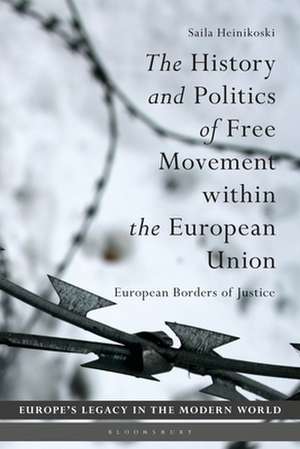The History and Politics of Free Movement within the European Union: European Borders of Justice: Europe’s Legacy in the Modern World
Autor Dr Saila Heinikoskien Limba Engleză Hardback – 25 noi 2020
| Toate formatele și edițiile | Preț | Express |
|---|---|---|
| Paperback (1) | 197.77 lei 43-57 zile | |
| Bloomsbury Publishing – 18 mai 2022 | 197.77 lei 43-57 zile | |
| Hardback (1) | 598.28 lei 43-57 zile | |
| Bloomsbury Publishing – 25 noi 2020 | 598.28 lei 43-57 zile |
Preț: 598.28 lei
Preț vechi: 858.49 lei
-30% Nou
Puncte Express: 897
Preț estimativ în valută:
114.52€ • 124.43$ • 96.26£
114.52€ • 124.43$ • 96.26£
Carte tipărită la comandă
Livrare economică 21 aprilie-05 mai
Preluare comenzi: 021 569.72.76
Specificații
ISBN-13: 9781350150546
ISBN-10: 1350150541
Pagini: 240
Dimensiuni: 156 x 234 x 21 mm
Greutate: 0.51 kg
Editura: Bloomsbury Publishing
Colecția Bloomsbury Academic
Seria Europe’s Legacy in the Modern World
Locul publicării:London, United Kingdom
ISBN-10: 1350150541
Pagini: 240
Dimensiuni: 156 x 234 x 21 mm
Greutate: 0.51 kg
Editura: Bloomsbury Publishing
Colecția Bloomsbury Academic
Seria Europe’s Legacy in the Modern World
Locul publicării:London, United Kingdom
Caracteristici
Introduces a new conceptual framework for analysing practical reasoning in political discourses and applies it in the analysis of national free movement debates
Notă biografică
Saila Heinikoski is Postdoctoral Researcher at the Centre of Excellence in Law, Identity and the European Narratives at the University of Helsinki, Finland. She is the co-author, along with Sia Spiliopoulou Åkermark and Pirjo Kleemola-Juntunen, of Demilitarization and International Law in Context (2018).
Cuprins
List of TablesList of Figures1. Introduction2. The Context: Free Movement in Europe and an Overview of Relevant Research3. Conceptual Framework and Methodology4. Agreement Dimension: Emphasis on Common Duties5. Community Dimension: Reproducing the Community of the European Union6. Utility Dimension: Optimizing Concrete Benefits7. Solidarity Dimension: Solidarity as the Ultimate Aim8. Understanding Different National Positions9. Free Movement Discourses by Country10. Free Movement Discourses as Practical ReasoningAppendix I: Material Selection and Speaker-Specific TablesBibliographyIndex
Recenzii
Integral to the European Union project has been the idea of free movement across national borders, but its implementation raises multiple questions about competing rationales, goals, and notions of solidarity. Saila Heinikoski helps us make sense of all this in her insightful analysis of elite debates over time. At this fraught moment in the history of that project, this is essential reading.
This book provides a fascinating and thoroughly researched analysis of discourse surrounding free movement in six major European countries and the European Commission, with implications for ideas of European identity and citizenship. Heinikoski demonstrates that while various migration-related tensions divide European countries, free movement may create a common sense of Europeanness.
This book provides a fascinating and thoroughly researched analysis of discourse surrounding free movement in six major European countries and the European Commission, with implications for ideas of European identity and citizenship. Heinikoski demonstrates that while various migration-related tensions divide European countries, free movement may create a common sense of Europeanness.









